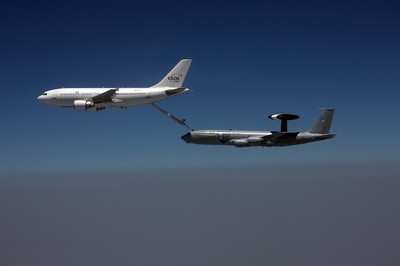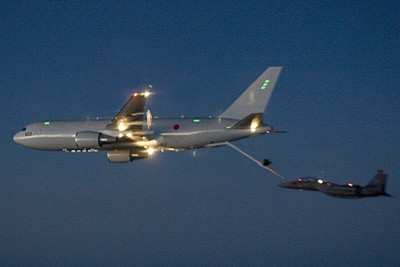New Rules May Help Edge Out Northrop Grumman/EADS
Lawmakers who supported Boeing's bid to build a new fleet of Air
Force refueling tankers advanced a plan in Congress that would
block the Defense Department from deviating from any of its
original specifications in vetting new tanker proposals. The
measure also would bar the Pentagon from giving extra credit to any
proposal that exceeds the Air Force's minimum requirements for the
tanker -- including its size and how much fuel it can deliver to
planes in midair.

The prohibition, part of a $488 billion defense spending bill
that won approval from a House Appropriations subcommittee on
Wednesday. The bill funds the Defense Department for fiscal 2009,
and would set aside $893 million for tanker program. Hoverer, it
ties the money to a host of conditions that may give Boeing an
advantage in the second round of competition.
Earlier this year, Boeing lost the tanker contract to rival
Northrop Grumman and EADS, the European parent company of Airbus.
Defense Secretary Robert Gates ordered the Pentagon to redo the
competition contract after Congress' investigative arm, the
Government Accountability Office found "significant" flaws in the
prior contest.
A major issue for Boeing and the rival Northrop Grumman/EADS
consortium is the size of the tanker sought by the government. In
the previous round of bidding, Airbus based its model on its larger
A330 commercial jet; the Boeing offering was designed around its
smaller 767.
The Pentagon has stipulated that at a minimum the new aircraft
must be capable of hauling the same amount of fuel as the existing
Boeing-built KC-135 tanker. But Young also has said the Defense
Department prefers a plane that can offload more fuel than the
existing aircraft. If the new solicitation gives preference to the
largest plane pitched by the two companies, Northrop Grumman's
model could continue to edge out Boeing's smaller design.
Rep. Todd Tiahrt -- whose Kansas district includes a Boeing
facility that would be involved in assembling the tankers -- has
said the size requirements defined by the Pentagon "can
predetermine who wins."
Boeing supporters complained that the Pentagon unfairly gave
extra points to EADS and Northrop Grumman during the first
competition because their proposal could deliver more fuel than
Boeing's offering. They accused the Air Force of misleading Boeing
by not disclosing that the service planned to give extra weight to
the biggest tanker. If the military's specifications give greater
weight to a larger plane, Boeing has said the company could decide
to pitch a model based on its bigger commercial plane, the 777. But
that could be a lengthy and costly process.
The tanker portion of the spending bill was written by Rep. John
Murtha, D-PA, head of the House Appropriations Defense Subcommittee
that approved the legislation Wednesday. Other requirements
include:
Requiring the Pentagon to calculate "life cycle" costs for the
proposed aircraft over 40 years instead of the 25 years used during
the last competition. An independent group would estimate the
40-year price tag for the tankers using the costs of fuel,
maintenance and any new construction in their calculation. Boeing's
supporters have said its tanker would be more fuel-efficient, and
they have advised the military should consider the costs of
building new hangars and runways to accommodate the Northrop
Grumman-EADS model.
Require the Air Force to obtain congressional approval before
spending money on the tankers, which would guarantee Congress has a
big role in the tanker contract.

The House is expected to consider the defense spending bill in
September, when it returns from a month-long recess that begins
this weekend. Ultimately, members of the House and Senate will
negotiate a final bill, and it will be up to that select group to
decide whether to keep the tanker restrictions in the
legislation.
 ANN's Daily Aero-Linx (04.15.24)
ANN's Daily Aero-Linx (04.15.24) Classic Aero-TV: 'No Other Options' -- The Israeli Air Force's Danny Shapira
Classic Aero-TV: 'No Other Options' -- The Israeli Air Force's Danny Shapira Aero-News: Quote of the Day (04.15.24)
Aero-News: Quote of the Day (04.15.24) Airborne 04.16.24: RV Update, Affordable Flying Expo, Diamond Lil
Airborne 04.16.24: RV Update, Affordable Flying Expo, Diamond Lil ANN's Daily Aero-Term (04.16.24): Chart Supplement US
ANN's Daily Aero-Term (04.16.24): Chart Supplement US




